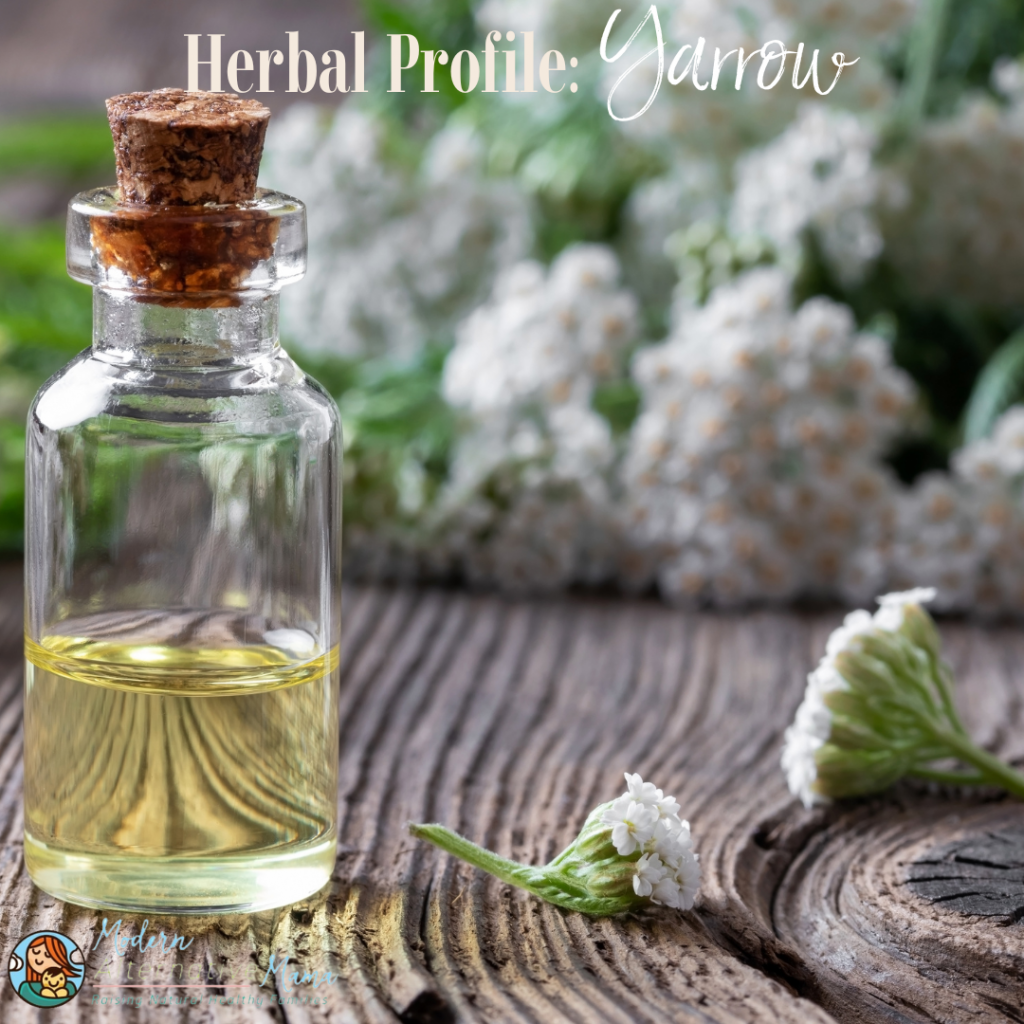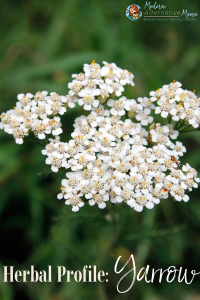What is Yarrow
Yarrow is sometimes referred to as milfoil, nosebleed, soldier’s woundwort, carpenter’s herb, stop-bleeding herb, or by its scientific name Achillea millefolium. In fact, its scientific name, Achillea, refers to the warrior Achilles in Greek mythology, as he used yarrow to treat his soldiers’ wounds, hence why it’s sometimes referred to as soldiers’ woundwort (1). Yarrow is a strong-smelling perennial herb that grows about 20 inches long with clusters of white, flat-topped flower heads that appear from June to November (2).
Traditionally, yarrow has been used to help hemorrhoids, headaches, bleeding disorders, bruises, cough, influenza, pneumonia, kidney stones, high blood pressure, menstrual disorders, fever, rheumatoid arthritis, gout, osteoarthritis, hemorrhagic disorders, chicken pox, cystitis, diabetes mellitus, indigestion, dyspepsia, eczema, psoriasis, and boils (3).
Health Benefits of Yarrow
With 140 different species of Achillea, it has been used for thousands of years for its potential health benefits, which include:
Anti-inflammatory Properties
Although inflammation is a natural bodily response, chronic inflammation can lead to detrimental health effects. Chronic inflammation has been linked with many diseases, such as type 2 diabetes, asthma, and certain cancers (4). One test-tube study determined that yarrow extract decreased inflammation and increased skin moisture (5). Other test-tube studies indicate that yarrow extract may reduce liver inflammation (6).
May Promote Wound Healing
Throughout history, since the times of Ancient Greece, yarrow has been used to treat wounds. Animal studies demonstrate yarrow leaf extract’s anti-inflammatory and antioxidant properties, which aid in wound healing (7,8). Other animal studies found that yarrow leaf extract may increase fibroblasts in rats (9). Fibroblasts contribute to the formation and regeneration of connective tissue and help your body recover from injury (10). In human studies, 140 women were observed over two weeks and learned that an ointment made from yarrow and St. John’s wort helped heal surgical incisions on the vaginal wall made during childbirth (11).
May Improve Digestion
As mentioned earlier, yarrow has long been used to treat various digestive issues. Yarrow’s compounds, such as flavonoids and alkaloids, are known to relieve digestive complaints thanks to their antispasmodic properties (12,13,14). For instance, in animal studies, the flavonoid antioxidants in yarrow fought digestive spasms, inflammation, and other IBS symptoms (15). In another animal study, yarrow extract tonic protected rats against stomach acid damage and demonstrated anti-ulcer properties (16).
May Improve Symptoms of Depression & Anxiety
Twenty percent of American adults are affected by anxiety (17), while approximately 280 million people worldwide have depression (18), but thankfully yarrow may help. Studies indicate that yarrow reduces the secretion of corticosterone, an elevated hormone during chronic stress (19), thanks to compounds like alkaloids (20). Another study successfully reduced anxiety and encouraged daily mental and physical activity in rats when orally administered yarrow essential oil (21). Remember, we do not recommend ingesting essential oils unless under the direct supervision of an aromatherapist or naturopath, which we will discuss more under safety concerns.
May Improve Brain Health
Many studies have been conducted in test tubes, animals, and even humans around the possibility that yarrow may aid various brain disorders. Animal studies noted that yarrow extract reduced the severity of encephalomyelitis, brain inflammation, and spinal cord and brain damage caused by it (22). Another animal study demonstrated yarrow’s antioxidants have anti-seizure effects on mice, making yarrow a promising option for people with epilepsy (23). Additionally, animal studies document that yarrow may prevent symptoms of Alzheimer’s and Parkinson’s diseases, including memory loss and impairments in physical movement and muscle tone in rats (24,25,26).
Anticancer Properties
Statistics say that 158.3 of every 100,000 individuals will die from cancer, but what if they didn’t have to (27)? Yarrow has antioxidant activity, total phenolic content, enzyme inhibition, and anticancer properties (28). Studies have found yarrow has antitumoral properties and induces cytotoxicity in pancreatic cancer cells (29).
Safety Concerns
The mainstream seems very anti-yarrow, claiming that although yarrow is commonly consumed in foods, yarrow products that contain thujone might not be safe, claiming it is poisonous in large doses. They also claim there isn’t enough reliable information to know if yarrow is safe when applied to the skin or for breastfeeding (30).
Other sources claim if consumed internally, thujone can be neurotoxic, convulsant, and hallucinogenic. They also claim long-term or excessive use of thujone-rich products can cause restlessness, vomiting, vertigo, tremors, renal damage, and convulsions (31). It’s noteworthy to mention that these symptoms were often associated with the drink absinthe. Wormwood’s thujone content was originally blamed, causing a drink ban until it was disproved in the late 1990s when they realized the psychological symptoms attributed to the liquor content of absinthe (32).
I’d like to reiterate that thujone acts on the GABA receptors in the brain and does not cause hallucinations. Actually, in many countries, thujone is allowed in foods and drinks, but the amount allowed in products is regulated (33).
Additionally, trusted herbalist Richard Whelan doesn’t note any of these concerns but suggests avoiding yarrow in pregnancy unless you can be sure that the variety you are using is low in Thujones. You would likely have to take a great deal of yarrow to run any risk of lowering birth weight, and there is no evidence of any other harm being likely. So, do not be overly concerned if yarrow has been taken inadvertently, do not be overly concerned. Yarrow appears very safe to use while breastfeeding and certainly can and should be used as a healing herb by the young or elderly.
Richard Whelan also notes a higher-than-average likelihood of allergy to yarrow as it is a Compositae (ragweed) family member. Symptoms such as itching or sneezing when using yarrow indicate that this is not the herb for you. 50% of Compositae-sensitive individuals (3.1% of a sample of 3851 people) were shown to be yarrow sensitive – those numbers mean you have about a 1% chance of being allergic to it (34).
Regarding yarrow essential oil, trusted aromatherapist Wendy Robbins cautions never to use any essential oils internally or undiluted. She also warns that a drug interaction may occur if using drugs metabolized by CYP2D, and neurotoxicity is possible. She also recommends a dermal maximum of 8.6% (35).
How to Use Yarrow
You can find yarrow in dried bulk, pills, powders, teas, extracts, or tinctures. Tinctures always contain the most concentrated amount of herbs. Teas and soups are also options, especially when following ayurvedic medicine recipes. If you’re a DIY person, some great starter recipes are:
Follow the recommendations of any supplement; some of my recommendations include:
- Earthley’s Detox Bath can support your body during a detox, during an illness, or just because you want to relax in a lovely scented soak. This blend can help with joint and muscle pain, headaches, lymphatic congestion, and rashes.
- Earthley’s Herbal Soothing Bath is the natural way to enjoy an at-home spa night. This floral soak is safe and beneficial to sensitive skin with no artificial fragrance or ingredients. Cleanliness and postpartum healing go hand-in-hand when you bathe with our organic bath tea. Soak away soreness, enjoy aromatherapy, and promote healing, all while relaxing.
- Earthley’s Lymphatic Cream is a lotion created to help relieve achy body parts caused by swollen lymph nodes. This cream tackles lymphatic congestion at the source and gently encourages drainage to help detox, reduce soreness, and improve overall wellness.
- Earthley’s Pain Relief Rub helps you experience true relief from back pain, muscle pain, joint pain, and more. Earthley’s synergistic cream combines naturally pain-relieving herbs like St. John’s Wort and yarrow with full-spectrum CBD. Rub a small amount into the sore spot and feel the relief within minutes!







